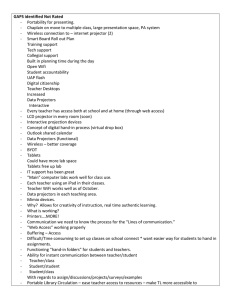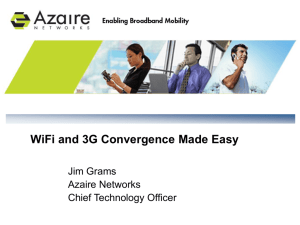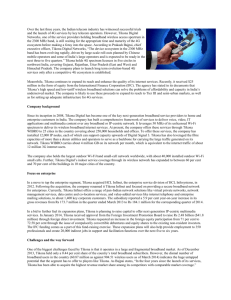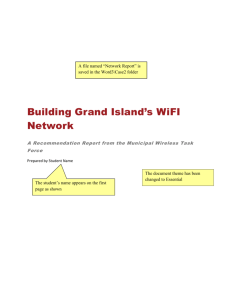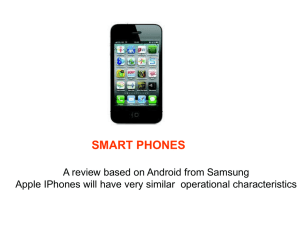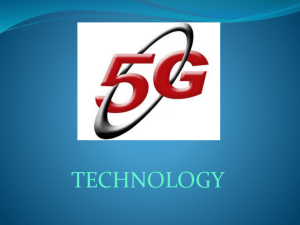SpiderWeb WiFi Project
advertisement
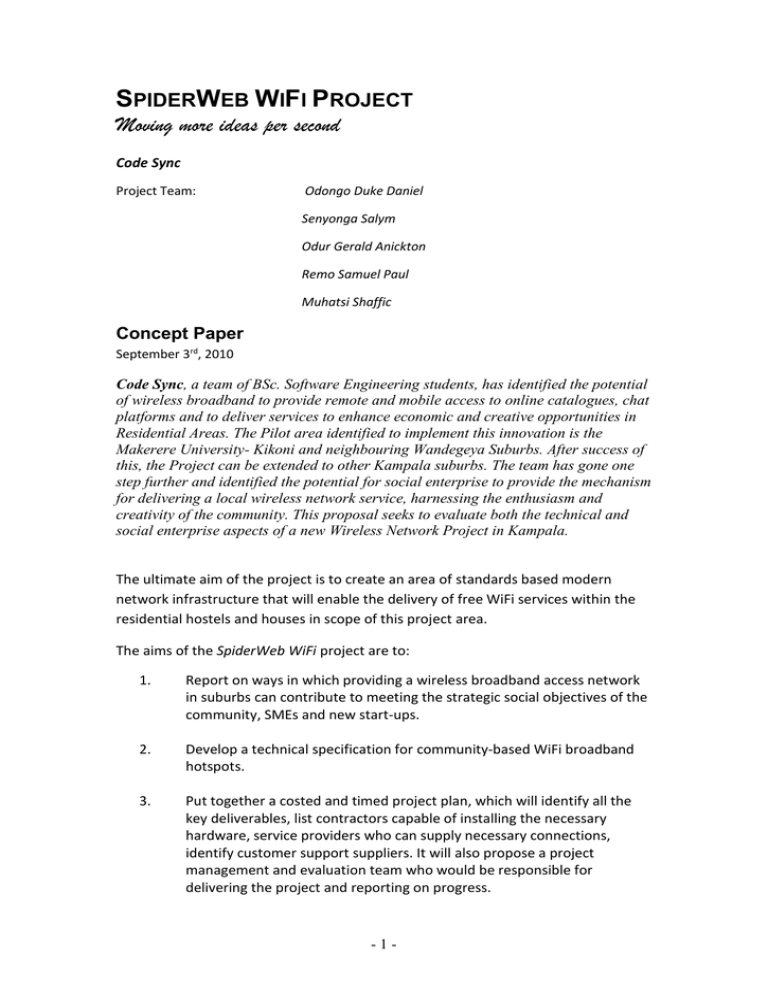
SPIDERWEB WIFI PROJECT Moving more ideas per second Code Sync Project Team: Odongo Duke Daniel Senyonga Salym Odur Gerald Anickton Remo Samuel Paul Muhatsi Shaffic Concept Paper September 3rd, 2010 Code Sync, a team of BSc. Software Engineering students, has identified the potential of wireless broadband to provide remote and mobile access to online catalogues, chat platforms and to deliver services to enhance economic and creative opportunities in Residential Areas. The Pilot area identified to implement this innovation is the Makerere University- Kikoni and neighbouring Wandegeya Suburbs. After success of this, the Project can be extended to other Kampala suburbs. The team has gone one step further and identified the potential for social enterprise to provide the mechanism for delivering a local wireless network service, harnessing the enthusiasm and creativity of the community. This proposal seeks to evaluate both the technical and social enterprise aspects of a new Wireless Network Project in Kampala. The ultimate aim of the project is to create an area of standards based modern network infrastructure that will enable the delivery of free WiFi services within the residential hostels and houses in scope of this project area. The aims of the SpiderWeb WiFi project are to: 1. Report on ways in which providing a wireless broadband access network in suburbs can contribute to meeting the strategic social objectives of the community, SMEs and new start-ups. 2. Develop a technical specification for community-based WiFi broadband hotspots. 3. Put together a costed and timed project plan, which will identify all the key deliverables, list contractors capable of installing the necessary hardware, service providers who can supply necessary connections, identify customer support suppliers. It will also propose a project management and evaluation team who would be responsible for delivering the project and reporting on progress. -1- 4. Examine the feasibility of setting up a local social enterprise to deliver the wireless broadband service, including model rules, processes of formation, management and business opportunities. 5. Demonstrate how a social enterprise approach to wireless broadband can succeed and to examine issues of long-term sustainability as well as ways of generating activities, addressing the digital divide and community cohesion. 6. Identify key actors who can form an expert reference group who will advise on the implementation of the project. A Broadband Social Enterprise for the Project Pilot area Social enterprises are increasingly seen as a mechanism for communities to aggregate demand and organize local broadband services. Initially focused on the problems of broadband access, particularly in rural areas, some of the better established community broadband initiatives are now leading the way in developing new broadband services, technology and training to create tangible social and economic benefits. Most of these projects have used a combination of wireless and satellite technology to deliver broadband services in these communities. The SpiderWeb WiFi project differs from most other broadband social enterprise initiatives in that we intend to provide free wireless services to meet specific local goals – the market and advertise commodities and to support the development of a creative community chat platform. However the SpiderWeb WiFi project can benefit from social enterprise by taking an inclusive, community-orientated approach that harnesses the skills and enthusiasm of local people to provide creative, affordable services over a WiFi platform. Without doubt it is an innovative project whose success will be regarded as a beacon for other communities. As a community broadband Initiatives, we intend to aggregate demand for service provision, offer access to friends and neighbors, and offer flexible access to academic material once the local exchange has been enabled. Further as we examine our success, we intend to continue working to provide free wireless broadband to outlying areas. Measure of Benefit Vs. Cost? SpiderWeb WiFi will provide this service as a promotional tool. By routing network users directly to defined web pages first, we have the opportunity to expose the user to all the amenities and services the city offers. By developing this content and tracking the traffic to these web sites, we will be in a better position to assess the -2- benefit of the Wi-Fi Project. Additionally, each mesh node could have its own entry portal that specifically advertises the businesses within that node's coverage area. The ability to target content to very specific geographic areas could be used to sell advertising that would offset some of the operational expenses. The Code Sync Team Odongo Duke Daniel is a second-year BSc. Software Engineering student at Makerere University. He brings a wealth of organizational and managerial leadership. He is passionate about technology and social entrepreneurship in developing countries. He is leading the development of the SpiderWeb WiFi project and spearheading the possibility of realization of a city-scale user-extensible wireless mesh in Kampala. Email: odongo.daniel@cit.mak.ac.ug Odur Gerald Anickton is a second-year BSc. Software Engineering student at Makerere University. Prior to joining the team, Gerald has been observing Uganda Internet users tastes and preferences. He is a firm believer in "Africa's promise" and is extremely excited about the prospects of Uganda as the Africa’s I.T frontier. Currently, Gerald is partnering with Duke to develop our business plan and deployments for SpiderWeb WiFi. Email: godur@cit.mak.ac.ug Muhatsi Shaffic is a second-year BSc. Software Engineering student at Makerere University. He will lead development of the low-cost wireless network infrastructure. Shaffic will be considering the effects of system design on user access and long-term growth. Email: smuhatsi@cit.mak.ac.ug Remo Samuel Paul is a second-year BSc. Software Engineering student at Makerere University. He has worked on a number of freelance projects prior to joining the team. Paul will lead the initial bandwidth shaping experiments and deployments for SpiderWeb WiFi. Email: remo.samuel@cit.mak.ac.ug Senyonga Salym is a second-year BSc. Software Engineering student at Makerere University. He is particularly interested enacting change and innovation amid the complexity of multiple constituencies and challenging dynamics. Salym will be working on developing our business plan to achieve scale and sustainability. Email: ssenyonga@cit.mak.ac.ug -3-
